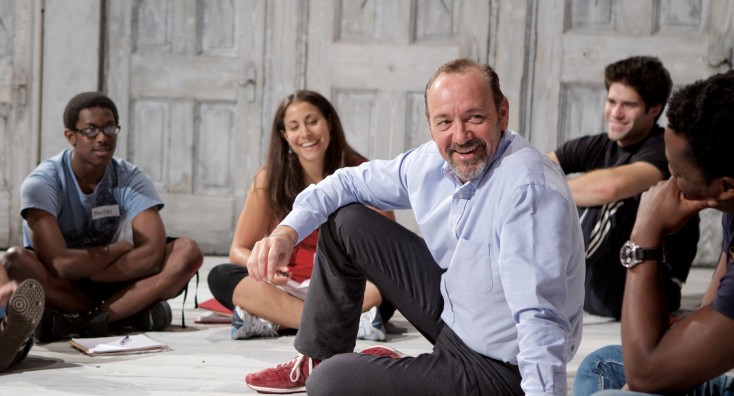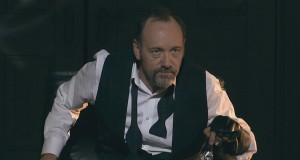By ANGELA DAWSON
Front Row Features
HOLLYWOOD—Kevin Spacey reunites with his “American Beauty” director Sam Mendes to bring the experience of taking Shakespeare’s Richard III on the road in an around the world touring production in the documentary “Now: In the Wings on a World Stage.”
The 54-year-old Oscar winner, who currently stars in the popular Netflix series “House of Cards,” recently spoke about the experience, which took him and the rest of the acting troupe from the Old Vic to Europe to Asia to the Middle East to Australia and then to the U.S., before returning home to London (where Spacey has served as artistic director at the Old Vic for more than a decade).
The actor, who also executive produced the documentary, arrives for an interview with his tennis racquet in tow, explaining that playing the game is like performing in a play because no two experiences are the same. That, and other pearls of wisdom were divined from the two-time Academy Award winner.
Q: When you watch this documentary, you begin to see a correlation between Richard III and Francis “Frank” Underwood, your modern day political animal from “House of Cards.”
Spacey: It’s not just a correlation. (The author of “House of Cards”) Michael Dobbs based the character Francis on Richard III. That’s why direct address (talking to the camera) exists in “House of Cards.” I know a lot of people think that Ferris Bueller (the teenager in “Ferris Bueller’s Day Off”) created direct address but he didn’t. It was a guy named William Shakespeare, and he invented it in this play. That’s why, for me, it was such an amazing circumstance that I closed this play in March 2012 at BAM (theater in Brooklyn), and on April 28 I started shooting “House of Cards.” So I cannot tell you what that meant for me in terms of how I approached “House of Cards.”
Q: Do you think you could have done “House of Cards” had you not just come off of doing Richard III?
Spacey: I don’t think I could have done “House of Cards” had I not spent the last 10 years doing theater.
Q: What is it about this character that attracted you to want to play him?
Spacey: It wasn’t really my choice to do Richard III. It was Sam’s choice. He really wanted to direct me in this play. I know people are always trying to connect the dots, that I must love playing these (ruthless) characters, but the truth is I never play these characters in the theater. Richard III is the first time I’ve played this kind of character in the theater ever, in my entire life. I have always done completely different kinds of things. What I would say is there is no doubt that these kinds of characters are investigations into the corridors of power, into the nature of power, and that they’re both characters that have such a remarkable ability to predict the way someone will respond. They’re able to be 16 moves ahead on the chess game, which is generally why they get what they want.
Q: Was it a tough transition to go to “House of Cards” after nearly 200 performances of Richard III?
Spacey: What was incredible for me in having done Richard III and then starting on “House of Cards,” is that I had been all over the world, breaking the fourth wall (by addressing the audience during the performance), looking out at the audience, and talking to people and being able to see this relationship between the character and the audience, and between Richard and the people he’s telling the story to. It was wild. I would point at people and say, “Do you believe that just happened?” and they’d go (nods head). When it came time for me to do the direct addresses in the “House of Cards,” the memory of that relationship was so burned in me that it really helped me, because now I’m just looking down the barrel of a lens. I don’t have eyes (to look at) so I’ve had to make a slight adjustment. Instead of thinking of so many people, I just try to think of my best friend, whom I’m telling things to that I wouldn’t tell anyone else.
Q: When you decided to do this world tour, when did the idea of making it into a documentary come into play?
Spacey: The conversations started with Sam Mendes because there were three seasons where he directed five productions (at the Old Vic). We started talking in the third season when we were doing Richard III. I had gone to Epidaurus in Southern Greece to watch (actor) Simon Russell Beale do (Shakespeare’s) “The Winter’s Tale,” and I was just like, “Oh my God! Whatever we do, we have to bring (Richard III) to this theater.” It was an unbelievable theater. Then I said, maybe’s there’s a way to capture this experience.
Q: Why did you want to do this international tour?
Spacey: I felt it was really unique. It’s probably been about 35 or more years since a theater company has gone around the world, and done this kind of tour. It just isn’t done anymore because it’s cost-prohibitive. That, and it was this unique combination of British and American actors coming together to do classic work, so it was the first transatlantic theater company.
Q: And when did the idea of documenting the tour on film come about?
Spacey: When Sam and I started talking about the tour, Jeremy (Whelehan), who had worked with me at the Old Vic as an assistant director in about seven productions and who had worked with me in (the Bobby Darin biopic) “Beyond the Sea,” came to me and said, “I think you should somehow document this,” and I said to him, “That’s what Sam and I have been talking about.” We didn’t quite know how to do it and I was also quite reluctant to say what it was going to be. So I was quite reluctant to give parameters and this is what we’re trying to do. It was more like, “Just fuckin’ capture it!” It wasn’t until the middle of the second season of the British project that Sam and I decided on (touring) Richard III. We started in the rehearsal room and Sam was incredibly generous as were all the actors to let the cameras in and film that process as we went along. We really did figure it out in editing. When I was shooting last season’s “House of Cards,” Jeremy (who directed the documentary) and our editor came to Baltimore for 11 weeks and cut the film.
Q: Did the actors in the company always know they were being filmed and how did they feel about it?
Spacey: There were some at the very beginning like (British stage actress) Gemma Jones who never wanted the camera in her face. She was like, “Get that ******* thing out of my face!” And she was very clear about it. But as time went on she got to know Jeremy. Jeremy’s this lovely Irish lad was very amenable. He’d say to her, “Oh, yes, absolutely. I didn’t mean to disturb you.” So she started to like Jeremy. She likes the boys as you get to see in the film. She started to soften up, and by the time we were halfway through, she was lifting her skirt. She knew the camera was there. They all did. Jeremy had, by this point, almost become a member of our company. People forgot there were cameras around. Also, people didn’t know what (the filming) was for. We just, literally, didn’t know how it was going to end up being used and how it was going to be distributed, if at all. It could have been just a very expensive home movie.
Q: What’s the difference between doing theater and being in a movie?
Spacey: Theater is alive. It is now, and then it’s gone. The big thing I always remember is no matter how good I might be in a movie, I’ll never be any better. It’s frozen. But in theater, I can be better tomorrow, and I can be better the night after that, and I can be better in a week. The journey you go through as an actor is incredible.
For more information about “Now: In the Wings of a World Stage,” go to www.nowthefilm.com.






